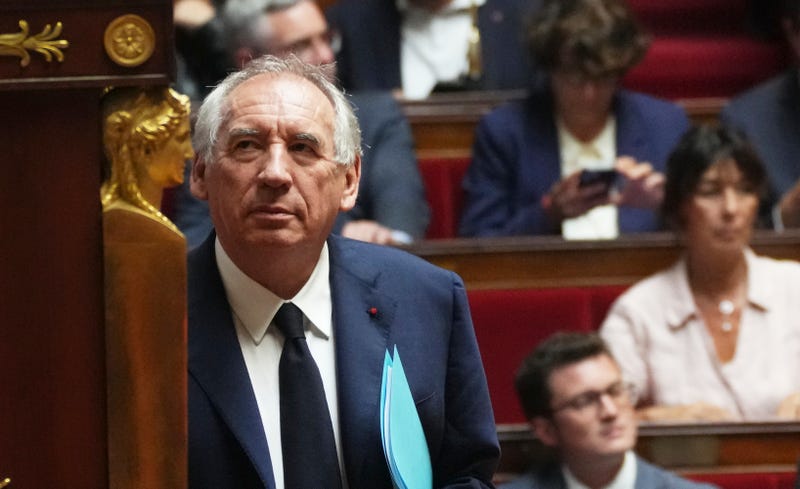
PARIS (AP) — French Prime Minister François Bayrou is making a last-ditch effort to save his job, urging lawmakers expected to topple him in a confidence vote later Monday to back his plans to curb France’s debts that he said are “submerging us.”
In an impassioned speech to the National Assembly, the 74-year-old stuck to his position that France’s spiraling public deficit and mounting debts are threatening the future of the European Union’s second-largest economy. He said state debts will weigh on future generations, leave France vulnerable to foreign creditors, and undermine its cherished social safety nets if not brought under control.
“Our country works, thinks it’s getting richer but keeps getting poorer,” Bayrou said, defiantly pausing for sips of water when hecklers on the legislative benches tried drowning him out.
The confidence vote later Monday, likely in the early evening, is widely expected to go against him, requiring Bayrou to submit the resignation of his minority government to President Emmanuel Macron.
A key vote
The expected demise of Bayrou’s short-lived premiership — he was appointed in December — would herald renewed uncertainty and a risk of prolonged legislative deadlock for France as it wrestles with pressing challenges, including budget difficulties and, internationally, wars in Ukraine and Gaza and the shifting U.S. priorities of President Donald Trump.
As president, Macron will continue to hold substantial powers over foreign policy and European affairs and remain the commander-in-chief of the armed forces. But domestically, his ambitions are increasingly facing ruin, with his inability to find government stability in the legislature stacked with opponents.
Bayrou lamented that lawmakers from opposite ends of the political spectrum were preparing to vote him out rather than rallying behind his position that France's debts are becoming untenable — a crisis he warned would remain even if he falls.
“You have the power to bring down the government but you don't have the power to erase reality," Bayrou said. He will be France's third prime minister in 12 months to fall if ousted.
The 577-seat National Assembly is interrupting its summer recess for the confidence vote that Bayrou requested. After his 40-minute speech, lawmakers were having their say before they vote either for or against his government — likely in the early evening. Lawmakers can also abstain.
Bayrou needs a majority of “for” votes to survive. If a majority votes against, France's constitution decrees that he would have to submit his government’s resignation to Macron, plunging France into renewed crisis.
Musical chairs
The 47-year-old president is paying a steep price for his stunning decision to dissolve the National Assembly in June 2024, triggering legislative elections that the French leader hoped would strengthen the hand of his pro-European centrist alliance in parliament's lower house. But the gamble backfired, producing a splintered legislature with no dominant political bloc in power for the first time in France’s modern republic.
The political uncertainty has largely hobbled Macron's domestic ambitions in his second and last presidential term that ends in 2027. Shorn of a workable majority in parliament for his centrist alliance, Macron has since rotated through three prime ministers, attempting to build consensus and stave off government collapse.
Macron's protégé Gabriel Attal departed in September 2024, after the Paris Olympics and just eight months in the job. Attal was briefly followed by former Brexit negotiator Michel Barnier, a conservative who became the shortest-serving prime minister in France’s modern republic when he was toppled by a no-confidence vote in December.
Macron then tapped his centrist ally Bayrou, a wily political veteran who, despite his experience, is now up against the same wall of unfavorable parliamentary mathematics in the National Assembly — where no single political grouping has sufficient seats to govern alone but can still pull the rug from under the government if they team up, targeting Bayrou together despite their sharp political differences.
Pressing problems for France
If Bayrou loses, Macron will again be forced to find a successor who'll operate in the same precarious environment and face the same pressing budget problems that have dogged Bayrou and his predecessors. Macron himself has vowed to stay in office until the end of his term but risks becoming a lame duck domestically if political paralysis continues.
Under the French political system, the prime minister is appointed by the president, accountable to the parliament and is in charge of implementing domestic policy, notably economic measures.
Arguing that sharp cuts are needed to repair public finances, Bayrou has proposed to cut 44 billion euros ($51 billion) in spending in 2026, after France’s deficit hit 5.8% of gross domestic product last year, way above the official EU target of 3%.
France is also faced with a massive debt crisis. At the end of the first quarter of 2025, France’s public debt stood at 3.346 trillion euros, or 114% of GDP. Debt servicing remains a major budget item, accounting for around 7% of state spending.
Bayrou’s plan, which includes removing two public holidays, has been slammed by his political rivals, who now have a golden opportunity to bring him down.